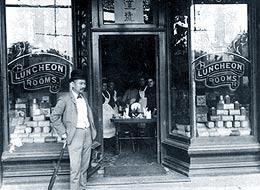Quong Tart, the Chinese Scottish Aussie
 1871 Australia: Mei Quong Tart (Mei Guangda; 1850 - July, 1903) became a naturalized British citizen at Braidwood, New South Wales.
1871 Australia: Mei Quong Tart (Mei Guangda; 1850 - July, 1903) became a naturalized British citizen at Braidwood, New South Wales.At this time he was employed by the government as an official interpreter amongst the Chinese gold miners of Braidwood, Araluen and Majors Creek, and as a sometime gold miner. Born in China (Longtengli near Duanfen in southern Taishan, Guangdong province), Tart was to become a prominent and popular Sydney merchant, importer and philanthropist.
Like many Chinese people of his day, his uncle was lured to Australia by the chance of finding gold (the Gold Rush began in 1851 and continued for some decades in various forms), and nine-year-old Quong came with him. However, he made his fortune in businesses such as tea shops, and became a prominent member of Sydney society. He was well loved by his staff as he was well ahead of his times for worker benefits, giving holiday and sick leave with pay, as well as time off for shopping and family commitments.
Some of his tea rooms were used as meeting places for the suffragette activities of Louisa Lawson's Dawn Club -- tea rooms at 137 King St and 777 George St, one at the Queen Victoria Markets (called the Queen Victoria Building, or QVB, from 1898), and possibly in the George St markets (aka Paddy's Markets, near Chinatown). One of Louisa's meeting places was 43 Royal Arcade (possibly another Quong Tart establishment).
When Quong Tart came aboard a steamer from China to Australia, he learned English from Scottish crew members in the boiler room of the ship. After arrival in Australia, young Quong worked for his guardians, the well-to-do Scottish Alice Simpson family in country NSW, so he became known for his Scottish accent, the wearing of kilts and his fondness for singing songs of Robbie Burns at public functions ...

Categories: australia, china, history, biography







0 Comments:
Post a Comment
<< Home